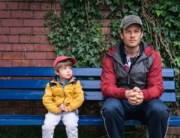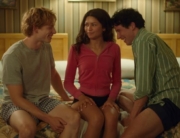In this appealing indie, the story of Frankie (Scott Marlowe), a young gay man in 1985 San Francisco, is used as a microcosm of how a culture was tested and began to slowly and imperfectly change its ways.
Set in an early year of the AIDS crisis, Test skillfully and subtly depicts the ignorance and fear in the air of that era. A rather passive, moony young man, Frankie is a dancer currently working as an understudy, who has been insulted by his choreographer for not being manly enough. When a new blood test for the virus is developed, Frankie’s “God I hope I get it” job quest becomes complicated by “God I hope I don’t get it” paranoia.
His navigation of treacherous waters is treated by writer/director Chris Mason Johnson as a kind of meditative thriller, where everyone and everything is both a little innocent and a little sinister. The strongest, quirkiest example comes in a casual sex encounter between Frankie and neighbor Bill (Kevin Clarke). It’s a delicate math of slightly awkward pauses and glances that Mason uses to create doubt in his audience: Does this person have the virus? Is that person hiding something? No doubt this reflects the painful uncertainty the men of that time were feeling.
What Test does best is present the beauty of the human body. Warm, natural light gives a kind of soft focus to the dancers. The precise lines they make in their movements harmonize with the elegance and simplicity of Mason’s compositions. Several performance sequences feature engaging choreography, seductively photographed. All of this eye candy only serves to underscore the stakes of the ever-present potential tragedy. So many like young bodies would be ravaged.
There is sophistication to the way Test represents its time period. While there are cheeky nostalgic nods—at one point Frankie gets his rotary phone cord impossibly tangled—a credible ’80s vibe is evoked without devolving into a series of gags. Instead, elements like a scene where two men try out condoms for the first time, or a moment when a female dancer can’t quite say the word “gay,” remind us of just how far away that time period really is.
Obviously, such distance is a double-edged sword. What came before can be forgotten or learned from. As AIDS has managed to produce new tests for new decades, this story is worth watching to see how a few well-intentioned people began to weather the storm, and to remember the many who couldn’t.







Leave A Comment